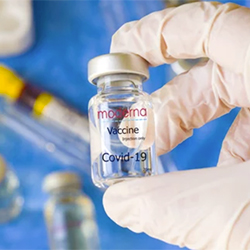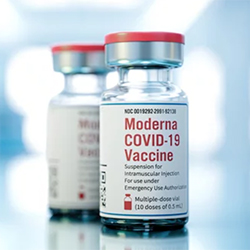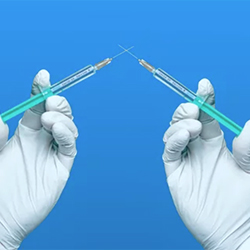By Marie Rosenthal, MS
In a unanimous decision, the Advisory Committee on Immunization Practices (ACIP) voted to recommend the Moderna COVID-19 vaccine (Spikevax) two-dose primary series for people 18 years of age and older, which the FDA approved on Jan. 31.
All other COVID-19 ACIP recommendations that address the use of COVID-19 vaccines under an emergency use authorization (EUA), such as booster or third doses for immunocompromised individuals, remain in effect.

The FDA granted full approval for the Moderna COVID-19 messenger RNA (mRNA) vaccine for people 18 years of age and older to be given in two doses. The Spikevax biologics license application was based on the FDA’s evaluation and analysis of follow-up safety and effectiveness data from the ongoing randomized, blinded, placebo-controlled clinical trial that supported the December 2020 EUA for the Moderna COVID-19 vaccine and information from post-EUA experience to further inform safety and effectiveness.
The committee reviewed the efficacy and safety data from the COVE trial, which was begun in July 2020. More than 30,000 participants were randomly selected to receive two doses of vaccine or placebo. These data demonstrated that Spikevax was 93% effective in preventing COVID-19, with 55 cases of COVID-19 occurring in the vaccinated group and 744 cases in the placebo group. The vaccine was also 98% effective in preventing severe disease.
The ACIP also reviewed the Vaccine Adverse Event Reporting System (VAERS) and preliminary data from the MOVING (Myocarditis Outcomes Following mRNA COVID-19 Vaccination) study, which so far is confirming what has already been found. The risk is highest among adolescents and young adult males, after the second dose. Onset typically begins within one week of vaccination, and most cases have responded well to medications and rest.
As of November 2021, VAERs had received about 989 reports of myocarditis that met the CDC case definition. Of those, 648 patients between 12 and 29 years of age completed a survey about their condition. Most were white. Sixty (17%) reported having a condition such as congenital heart disease, history of myocarditis or Kawasaki disease, and asthma. Ninety-two were hospitalized, and 4% were readmitted because of a cardiac concern. Twenty percent received a heart medication during their last appointment with a provider.
In addition, a good number (360) reported missing school or work: 46% reported missing school and 19% reported missing work.
However, at 90 days after the myocarditis diagnosis, most patients reported no impact on their quality of life.
Sara Oliver, MD, MSPH, a CDC Epidemic Intelligence Service officer, presented the findings of the work group:
- COVID-19 vaccines have been a critical tool in this pandemic, preventing millions of COVID-19–associated hospitalizations and deaths.
- Hundreds of millions of doses have been given, and the vaccine is being closely monitored for safety and efficacy.
- Getting unvaccinated people vaccinated with a primary series is very important, and having two FDA-approved vaccines might help convince some holdouts.
“Now with millions of people vaccinated, we can see the power and the value of vaccination,” said Beth P. Bell, MD, MPH, a clinical professor in the Department of Global Health at the University of Washington School of Public Health, in Seattle. “We continue to see that the biggest risk to individuals is not getting vaccine. So, I hope that by this transparent process where we have summarized in a very sort of comprehensive way … the benefit of getting vaccinated.
“And I hope that at least for some people who are still thinking about whether they should get vaccinated, that this process and this transparent meeting helps them to do the most important thing that they can do to protect themselves and their family, and that is to get a vaccine.”
ACIP Chair Lee M. Grace, MD, MPH, the associate chief medical officer for practice innovation at Lucile Packard Children’s Hospital, in Stanford, Calif., called the unanimous vote straightforward.
“We now have another fully approved COVID-19 vaccine,” said CDC Director Rochelle Walensky, MD, MPH, in a statement after the CDC accepted the recommendation. “If you have been waiting for full approval before getting vaccinated, now is the time to join the nearly 212 million Americans who have already completed their primary series.”




